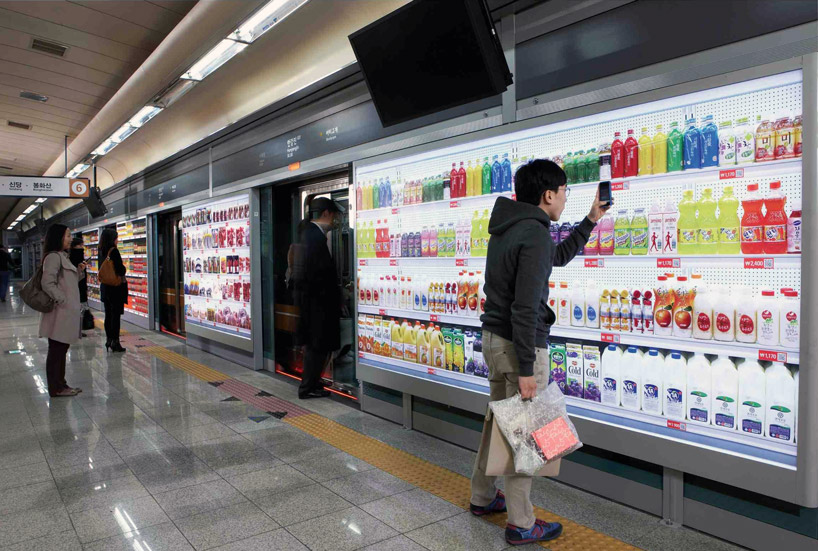
With increasingly busy schedules, never-ending office hours, and an excessive amount of time spent commuting, it can sometimes be hard to find enough time to do your groceries. Ordering take out may be an option once in a while. However, it is not the cheapest or healthiest option, with an empty bank account and increasingly tight pants as a result.
One country with particularly long working hours is South Korea. With an annual average of 2124 hours ‘actually’ worked per worker, South Korea comes in fourth globally. To put this into perspective, the OECD average is 1770 hours annually and the Dutch average is 1425 hours annually.
To accommodate for all this ‘wasted’ time commuting to and from work, Tesco introduced ‘virtual stores’ in South Korea in 2011. The main idea behind these virtual stores is that busy commuters can scan the QR codes of the displayed products whilst waiting for trains or buses. Located mainly near frequently visited public places, such as subway and bus stops, these virtual stores instantly attracted the eyes of restless businesspeople.
Here is how the virtual stores exactly work:
- Commuters download the Tesco ‘Homeplus’ app on their phones.
- When they come across a Homeplus display, commuters can scan the QR codes of the products they want. These are displayed in such a way that shoppers feel as if they are standing in the aisle of any other Tesco store.
- The scanned products are placed in the online shopping basket of the customer and are paid for once they have finished their order.
- The time for home delivery is scheduled. Since most commuters use this service in order to save time, same-day delivery has become the norm in South Korea – with most orders being placed at ten am and four pm.
Tesco’s HomePlus app has proven to be a major success for the company. In less than one year over 900000 people downloaded the app, which made Homeplus the number one shopping app in South Korea. Furthermore, online sales increased by 130 per cent and registered app users increased by 76 per cent due to Tesco’s introduction of the HomePlus app and the virtual stores. Lastly, Tesco opened up an additional 22 HomePlus virtual stores.
Despite becoming the number one online retailer in South Korea, Tesco needed to sell their South Korean Home plus branch in 2015 for £4.2bln, to dampen the company’s overall debt (over £20bln) and to revitalise its UK business.
Given the initial success in South Korea, will other countries become as excited about virtual shopping? Can virtual stores become the global standard in the future? Or is it only a concept that appeals to this specific demographic? Only time will tell…
Sources:
http://www.geek.com/mobile/koreas-tesco-reinvents-grocery-shopping-with-qr-code-stores-1396025/

Very interesting post! It got me thinking, and these are my thoughts on your questions:
I think for other big cities, such as New York, Tokyo and Singapore, there is a higher likelihood that virtual shopping will become a reality. For example here in Rotterdam, I do not see it happen anytime sooner. However, as the whole world is becoming more and more dependent on technology, who knows what the future will look like! I think it is a great idea for people with a busy workschedule, who still would like to cook & eat healthy, but who want to save time on shopping for groceries.
Wouldn’t you agree that when this new advertising strategy wears off the amount of users who are going to use it will decrease as it is actually easier to directly search for the items in the app itself? I think the virtual grocery store is a great way to drive in new customers, but not such a great way to do your shopping every day/week ;).
And with convenience there comes also a great privacy risk: HomePlus can gather an enormous database of customer purchase behaviour directly linked to your name and address. HomePlus was actually selling customer data to insurance companies and got sued over this in 2014: http://www.bbc.com/news/business-29328712